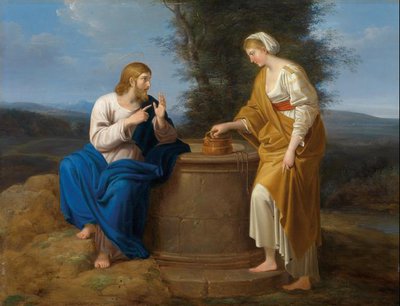Thoughts for the Day
Thursday, 23rd February 2023: Jesus, the living water
Water Samaritan Jesus John 4
Reading : Verses from John, Chapter 4

Jesus left Judea and started back to Galilee. But he had to go through Samaria. So he came to a Samaritan city called Sychar, near the plot of ground that Jacob had given to his son Joseph. Jacob’s well was there, and Jesus, tired out by his journey, was sitting by the well. It was about noon.
A Samaritan woman came to draw water, and Jesus said to her, ‘Give me a drink’. (His disciples had gone to the city to buy food.) The Samaritan woman said to him, ‘How is it that you, a Jew, ask a drink of me, a woman of Samaria?’ (Jews do not share things in common with Samaritans.) Jesus answered her, ‘If you knew the gift of God, and who it is that is saying to you, “Give me a drink”, you would have asked him, and he would have given you living water.’ The woman said to him, ‘Sir, you have no bucket, and the well is deep. Where do you get that living water? Are you greater than our ancestor Jacob, who gave us the well, and with his sons and his flocks drank from it?’ Jesus said to her, ‘Everyone who drinks of this water will be thirsty again, but those who drink of the water that I will give them will never be thirsty. The water that I will give will become in them a spring of water gushing up to eternal life.’ The woman said to him, ‘Sir, give me this water, so that I may never be thirsty or have to keep coming here to draw water.’
(Lectionary, New Revised Standard Version)
Thoughts
Today we look at water again in the account of Jesus and the Samaritan woman. Jesus and his disciples are travelling from Jordan in the south to Galilee in the north. There are only two ways to travel, along the west bank of the Jordan, or through Samaria, the latter will take three days, but the former will be twice as long. As we have seen before, the rift between Samaritans and Jews is enormous. Settled by Assyria after their invasion, by foreigners, things were made worse when an alternative temple was built on Mount Gerizim. We should also note, that no Jewish man would speak to a woman in public (the disciples are surprised on their return), and second, the disciples have gone into Sychar to purchase food (is contact with Jesus changing their attitudes?).
The conversation between the Samaritan woman and Jesus quickly changes from getting water to drink from the 100 foot deep well, to a symbolic reference to Jesus as the "living water". In such a hot land it's not surprising there are many references in the scriptures to God offering his people "living water" or for His people being "thirsty for God". Water was, after all, a most precious commodity in such a dry and parched land.
When we come to God He offers us cool, clean, refreshing, 'water for our soul'. We cannot live without water for our body, and we cannot live without water for our soul either.
Prayer
Lord Jesus,
we come to You this Lent
for refreshment,
for cleansing,
and for the water of life.
May we turn to You
the Living Water
to be renewed,
so that we may go out
into the world once more
as Your agent.
Amen.
You might like to look up these references to being thirsty for God, and to living water: